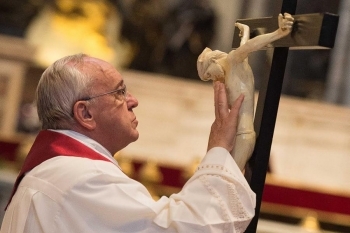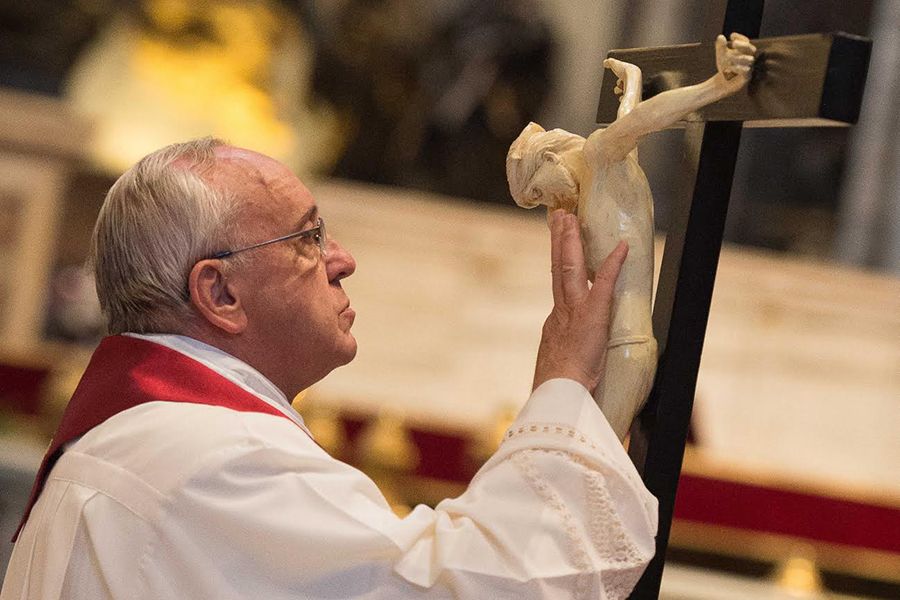
.png) Cedric Prakash
Cedric Prakash

Pope Francis has done it again. On 19 March 2022 (Feast of St Joseph), the ninth anniversary of the formal inauguration of his pontificate, he published Praedicate Evangelium (Preach the Gospel), his new Constitution for the structure of the Roman Curia. It was a reform that was promised at the beginning of his pontificate; several aspects of it have been implemented over the years. The final document, however, does make some significant changes and provides the vision of a Curia that is evangelical and service-oriented; it promotes synodality and is highly professional. It is shorn of careerism. In sum and substance, it challenges the Curia in particular, and the Church in general, to read, understand and respond to the signs of the times. The new Constitution is expected to be a pastoral turning point for the Church. It will come into effect from 5 June 2022, the Solemnity of Pentecost.
On 19 March, only the text in Italian was released to the world which naturally generated much flak from the international media who expected a simultaneous release in all the major world languages – which is normally done. A couple of days later, on 21 March, there was a two-hour press conference addressed by some high-profile Vatican officials including Cardinal Marcello Semeraro, Prefect of the Congregation for the Causes of Saints; Bishop Marco Mellino, Secretary of the Council of Cardinals; and Jesuit Fr. Gianfranco Ghirlanda, a canon lawyer who was the former rector of the Pontifical Gregorian University.
At the Press Conference, Bishop Mellino noted that the title of the document itself, Praedicate Evangelium, underscores the missionary dimension and core duty of evangelization, proclaiming the Good News of the Gospel, which regards all the offices assisting the Pope in his pastoral ministry. He also pointed out how the Roman Curia is by its nature at the service of the universal Church and under the direction of the Pope assisting him to carry out his universal pastoral mission throughout the world. He also noted how the concept of synodality enters into the equation now, as the Roman Curia becomes increasingly instrumental in listening and dialoguing with the particular Churches as it carries out its service.
Cardinal Semeraro noted how Praedicate Evangelium, which was in the making for many years through discussions going back to the conclave of 2013, brings to completion the reform of the Roman Curia. Many of the reforms, he said, have been implemented in recent years, even before the new Constitution was finalized, although all the offices of the Roman Curia will need to assure their current statutes are fully in line with the final indications set in the Apostolic Constitution. He added that ‘dicastery’, a lay term, was certainly more acceptable than the former ‘congregation’ which was a clerical term.
Fr Ghirlanda highlighted the role of the laity in the new Constitution and called it ‘innovative’. A layman or laywoman can now preside over a department according to the criteria indicated. He said that the power to carry out an office “is the same whether it comes from a bishop, a presbyter, a consecrated man or woman, or a layman or woman….
The power of government in the Church does not come from the sacrament of [Holy] Orders, but from the canonical mission.” The new constitution, for Fr. Ghirlanda, sought to enhance local bishops’ conferences, as well as continental bodies of bishops. Bishops’ conferences are mentioned more than 50 times in the new document, compared to just twice in the previous Vatican Constitution, the 1988 Pastor Bonus (which has now been superseded). “What is established by an episcopal conference cannot contradict the universal Magisterium, otherwise we are outside the ecclesial communion,” he said. Asked whether five-year terms for heads of dicasteries could create problems with continuity, Fr. Ghirlanda said that leaders who proved competency would be given a further five years in their posts. “People who stay too long in government positions can develop centres of power. And in the Church that is never appropriate. Turnover brings new ideas, new skills, openness.”
Praedicate Evangelium (PE) focuses on evangelization. There is no doubt about that since the very title emphasizes that the reform is geared toward evangelization. The Pope becomes the Prefect of the new Dicastery for Evangelization, now the first dicastery of the Curia. He has given himself the job of chief missionary of a missionary Church. The reform, however, goes beyond the theme of evangelization. ‘Bureaucracy’, good administration, is needed and is not denied. It is much more than a mere restructuring of the bodies of the Roman Curia. It represents a change of philosophy and more so, a way of proceeding for the Universal Church. Pope Francis is determined to put evangelization at the heart of the Roman Curia.
The opening sentences of the Constitution sets the tone of a missionary conversion. Praedicate Evangelium returns to the initial vision Pope Francis had for a “missionary conversion” for the entire Church. Indeed, the opening citation of PE is from St. John Paul II’s Redemptoris Missio (Mission of the Redeemer), namely the “proclamation of the gospel” is the “primary service which the Church offers.” A rough translation from the original Italian says: “The "missionary conversion" of the Church is destined to renew the Church according to the image of Christ's own mission of love. His disciples are, therefore, called to be "light of the world" (Mt 5:14). This is the way in which the Church reflects the saving love of Christ which is the Light of the world (cf. Jn 8:12). It becomes more radiant when it brings to men the supernatural gift of faith, “light that guides our journey through time” and serving the Gospel because of this light. “May it grow to illuminate the present until it becomes a star that shows the horizons of our journey, in a time when man is particularly in need of light."
The Document titled ‘Apostolic Constitution on the Roman Curia and its Service to the Church in the World’ is heavy in content. That is to be expected. With 250 Articles, the seventy-plus pages do not make easy reading. Besides the first published version in Italian also had some errors. Many were also not happy with the haphazard way such a landmark and defining document of the Church was released. At the above-mentioned press conference, Loup Besmond de Senneville, the head of the Vatican journalists’ association, read a statement expressing “astonishment” that the Vatican released the Constitution without any prior notice for such an important document for the universal Church. Whatever the misgivings about the ‘launch’ of the reforms, one dimension which emerges is that Pope Francis is a Pastor, Pilgrim and Prophet and he is determined, in this tenth year of his pontificate, that beginning with the Vatican Curia, the Church becomes exactly that: pastor, pilgrim and prophet to the women and men of our times.
There are, however, several questions which need to be answered before Pope Francis’ prophetic vision becomes a reality in a Church which needs to ‘let go!’ One needs to look at the Church in India first: clericalism and patriarchy are both strongly enmeshed. Subsidiarity hardly exists with tremendous power concentrated with Bishops and parish priests. Ideally, the reforms demand an enhanced role for laity (particularly women), a more collegial working and above all, the synodal process of communion, participation and mission to be actualised at every level.
This is certainly going to be a tall order. Parish councils often consists of yes-men and yes-women, sometimes condemned to be doing cosmetic, servile work and posing for a photo-op. There is very little dialogue, discernment and participative decision-making processes. There are exceptions of course, but these are rarities. The laity continues to conveniently fit into that traditional mould of ‘pray, pay and obey.’ The Synodal Process which is currently underway in most dioceses is relegated to a series of meetings, meant to produce reports for the records. Not much effort seems to be made in truly empowering the laity and to provide them with the prophetic courage they need to respond to critical issues facing the Church and the country.
It is clear that structures – with the merging of some Dicasteries and the formation of new ones -- are bound to and have to change. The question being raised at this stage is, will they become more empowered, effective and prompt enough to respond appropriately to the many challenges both within the Church and the world at large? Given the reality of the Church in India today, there are hardly any systems and procedures in place. The reforms initiated by Pope Francis are certainly radical in nature – but like his ‘Evangelii Gaudium’, ‘Laudato Si’ and ‘Fratelli Tutti’ they could remain only on paper if there is no political will to ensure the mainstreaming and implementation of these reforms to the smallest and most remote parish, to the lost, least and last individual.
It is significant that Pope Francis launched his reforms on the Feast of St Joseph and the anniversary of his Pontificate. St Joseph has always been someone extra-special in his life. He often refers to Joseph as a ‘dreamer’ capable of accepting the task entrusted to him by God. In one of his earlier homilies he said, “Christians, especially young people, should follow the example of St Joseph who was not afraid to listen to his dreams, like when he was told in a dream not to be afraid to take Mary as his wife and again when he was told to flee with Mary and Jesus to Egypt. When we dream great things, beautiful things, we draw close to God’s dream, the things that God dreams for us. May he give young people – because he, too, was young – the ability to dream, to risk and to take on difficult tasks that they have seen in their dreams.” Reforming the Church of today is one of the dreams of a prophetic Pope. After years of hard work, the process has begun. The journey ahead is not going to be easy.
Pope Francis has been regularly sharing a very personal secret. “I would like to share with you something very personal. I like St Joseph very much. He is a man of strength and of silence. On my desk in my room, I have a statue of St Joseph sleeping. While sleeping he looks after the Church. Yes, he can do it! We know that. When I have a problem or a difficulty, I write on a piece of paper and I put it under his statue so he can dream about it. He now sleeps on a mattress of my notes. This means please pray to St Joseph for this problem. That is why I sleep well: it is the grace of God!”
St. Joseph is now surely sleeping on one more note from Pope Francis which reads, “help us to put into practice the preaching of the Gospel today!”
(The writer is a human rights, reconciliation & peace activist/writer. Contact: cedricprakash@gmail.com )